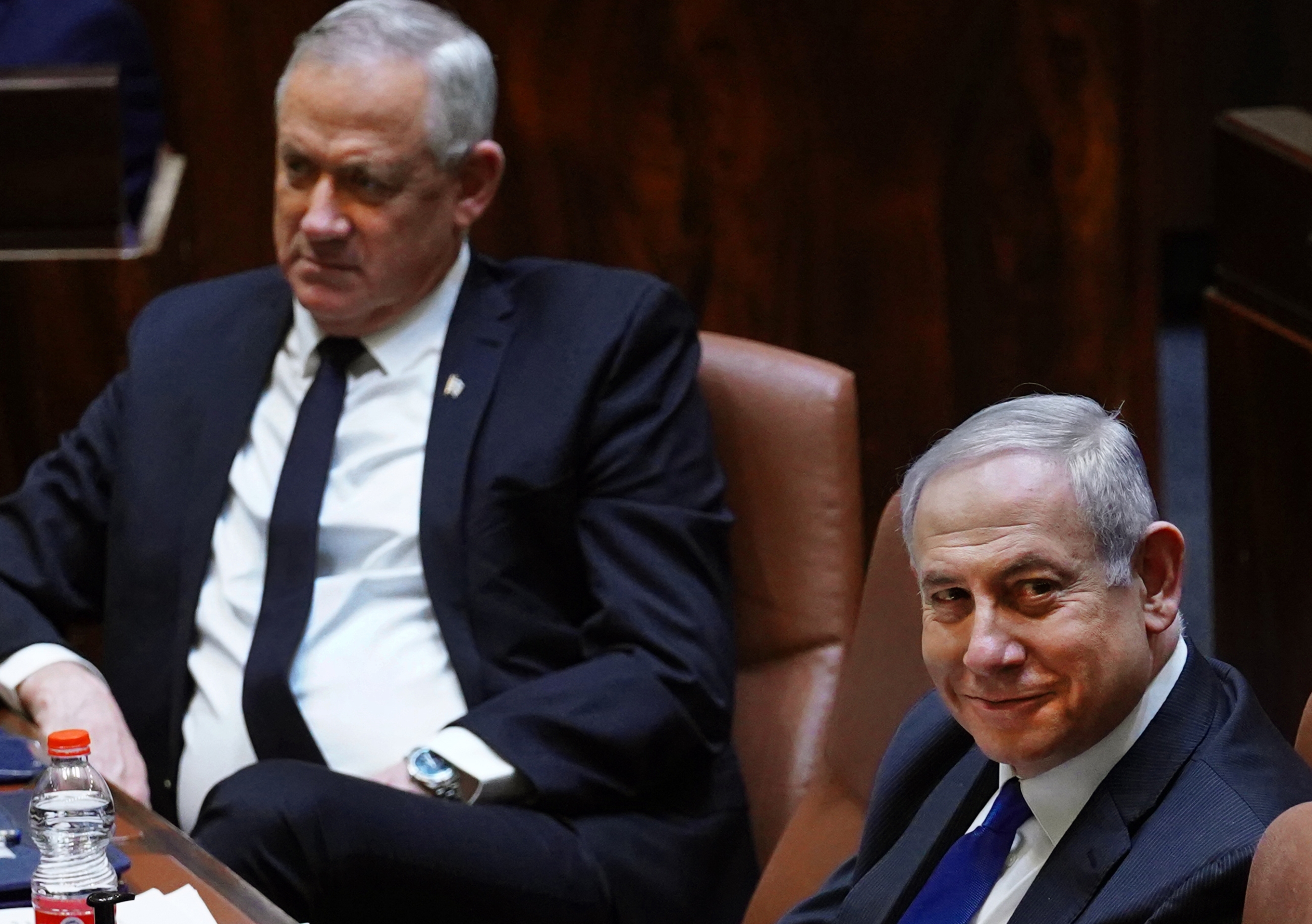Israeli press review: Two prime ministers, a bloated government, but no election

Israel's two premiers
Israel has sworn in two prime ministers for the first time in its 72-year history.
Under a coalition deal struck with his election rival Benny Gantz last month, Benjamin Netanyahu will serve as prime minister for 18 months, before the leader of Israel's Blue and White party takes over the position in a rotation deal.
Gantz, who was previously army chief of staff, will now serve as defence minister, while also holding the title of alternate prime minister.
The rivals looked stalemated again after Israel's third election in a year in March, but Netanyahu and Gantz finally ended the period of political instability by coming together in a large coalition citing the coronavirus pandemic as a reason to put differences aside.
New MEE newsletter: Jerusalem Dispatch
Sign up to get the latest insights and analysis on Israel-Palestine, alongside Turkey Unpacked and other MEE newsletters
“The cost of this government is lower than more elections,” Walla news site reported Netanyahu saying at the opening meeting of the cabinet. The government's first task is to tackle the coronavirus, he added.
Gantz, meanwhile, noted that “we are living in abnormal times”.
“We have to work with each other for all citizens of Israel, Jews and Arabs alike, religious and secular, it doesn't matter,” Ynet reported him saying.
The unity agreement will leave Netanyahu in power as he goes to trial for corruption charges on 24 May, the first such proceedings against a sitting Israeli prime minister.
Netanyahu has been indicted on charges of fraud, breach of trust and accepting bribes, in a series of scandals involving trading favours with wealthy media moguls.
The longtime prime minister has repeatedly denied any wrongdoing and blames the charges on a media-orchestrated plot to oust him.
Biggest government in Israel's history
Netanyahu and Gantz may have come to an agreement - but it has resulted in a government with a vast array of portfolios just to fit everyone in. It is the largest government in Israel's history, Haaretz reported.
Thirty-six ministers and 16 deputy ministers make up this administration, with several positions set to rotate in 18 months or switch as senior Likud politicians take up ambassadorships.
Gabi Ashkenazi of the Blue and White party assumes the role of foreign minister - until 18 months' time, that is, when Gantz is set to move from the defence ministry to the prime minister's office. From then, Ashkenazi, who like Gantz is an ex-army chief, will serve as defence minister.
Miri Regev of the Likud party is set to begin as transportation minister before replacing Ashkenazi in the foreign ministry.
Other Likud heavyweights, Yisrael Katz and Amir Ohana, will become finance minister and public security minister, respectively, while Yuli Edelstein takes the health ministry.
From Blue and White, Avi Nissenkorn will hold the ministry of justice (with Netanyahu holding power over key judicial appointments). Yoaz Hendel, who ran on the Blue and White ticket and attempted to stand in the way of Gantz toppling Netanyahu by sitting with the Palestinian Joint List, takes the Ministry of Communications.
Labor party leader Amir Peretz, meanwhile, becomes economy minister. Orly Levy-Abekasis, who ran on Labor's left-wing ticket, is given the newly created community development ministry.
Out of the government are prominent far-right figures Naftali Bennett and Ayelet Shaked, who decided to sit in opposition when it became clear large portfolios were not in the offering. Their nationalist-religious Yamina running mate Rafi Peretz, however, becomes minister for Jerusalem affairs.
Ashkenazi says Trump deal a 'historic opportunity'
Just one day into his position as foreign minister, Ashkenazi endorsed US President Donald Trump’s Middle East plan, saying that it is a “historic opportunity", Ynet reported.
Netanyahu has already made it clear that his government intends to annex large parts of the occupied West Bank as early as this summer. The coalition agreement allows him to present an annexation proposal as soon as 1 July.
"President Trump presented us with a historic opportunity to shape the future of the State of Israel and its boundaries for decades to come,” Asheknazi said.
He added the Israeli government will advance with its plan “responsibly, with full coordination with the United States and maintaining all of the State of Israel’s peace agreements and strategic interests”.
In January, Trump unveiled his so-called "deal of the century" addressing the Israeli-Palestinian conflict, which would see Israel take about a third of the West Bank in exchange for recognising a disjointed Palestinian state with no control over its borders or airspace.
The Palestinians claim the entire West Bank, captured by Israel in the 1967 war, as the heartland of an independent state.
Annexing chunks of this territory would likely put an end to the Palestinians' already diminishing hopes of a two-state solution and would anger the international community, which overwhelmingly supports Palestinian statehood.
Middle East Eye delivers independent and unrivalled coverage and analysis of the Middle East, North Africa and beyond. To learn more about republishing this content and the associated fees, please fill out this form. More about MEE can be found here.




